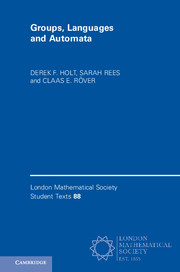1 - Group theory
from PART ONE - INTRODUCTION
Published online by Cambridge University Press: 16 March 2017
Summary
Introduction and basic notation
In this book we are assuming that the reader has studied group theory at undergraduate level, and is familiar with its fundamental results, including the basic theory of free groups and group presentations. However, in many of the interactions between group theory and formal language theory, it is convenient to consider group presentations as special cases of semigroup and monoid presentations, so we describe them from that aspect here.
We refer the reader to one of the standard textbooks on group theory, such as [223] or [221] for the definitions and basic properties of nilpotent, soluble (solvable) and polycyclic groups,
We also include some specific topics, mainly from combinatorial group theory, that will be required later. The normal form theorems for free products with amalgamation and HNN-extensions are used in the proofs of the insolubility of the word problem in groups, and we summarise their proofs. We introduce Cayley graphs and their metrical properties, and the idea of quasiisometry between groups, which plays a central role in the area and throughout geometric group theory, and we define the small cancellation properties of presentations and describe related results.
The final section of the chapter is devoted to a brief introduction to some of the specific families of groups, such as Coxeter groups and braid groups, that arise frequently as examples throughout the book. The informed reader may prefer not to read this chapter in detail, but to refer back to it as necessary.
Information
- Type
- Chapter
- Information
- Groups, Languages and Automata , pp. 3 - 35Publisher: Cambridge University PressPrint publication year: 2017
